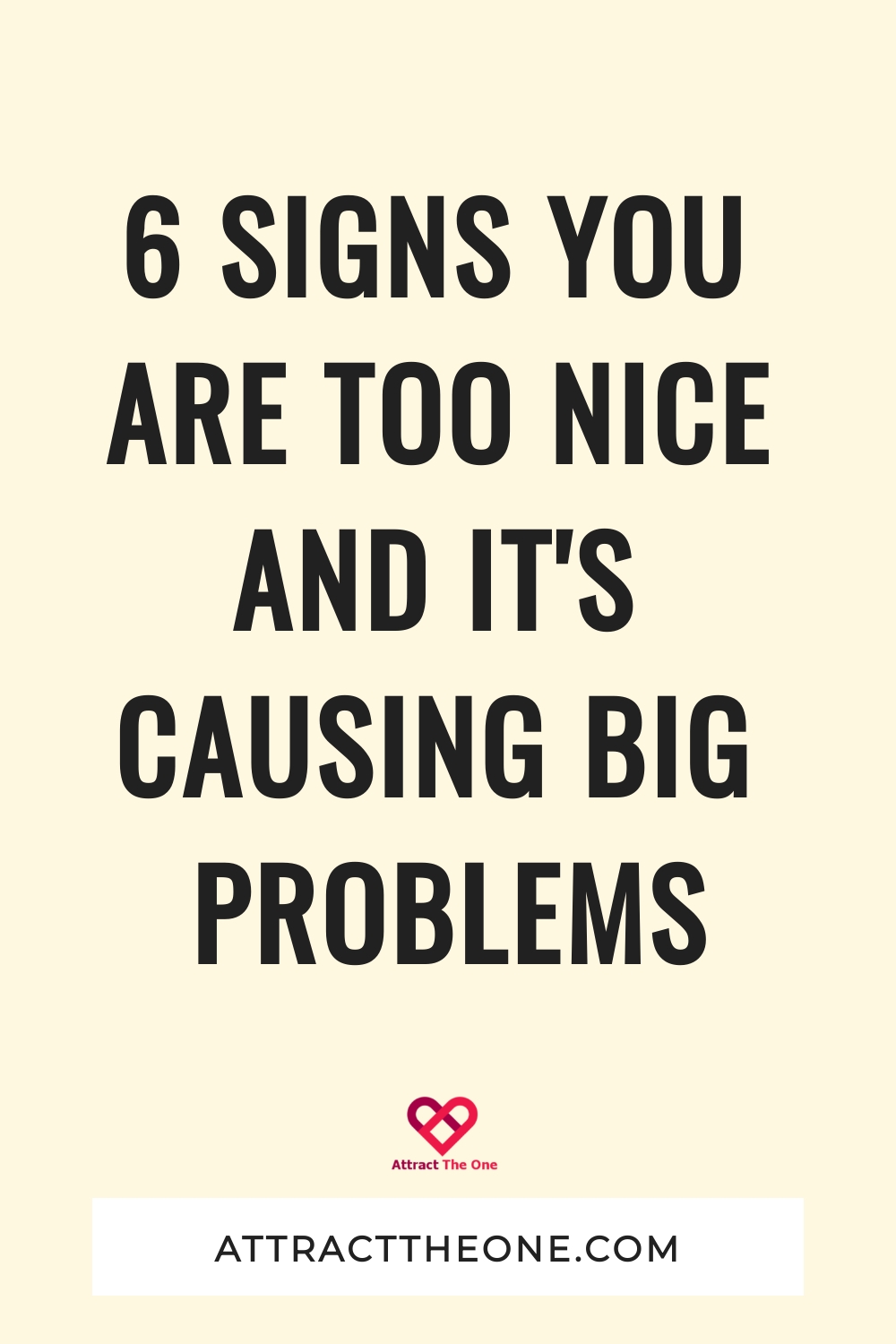We do all kinds of crazy sh*t because we want other people to like us.
When does being nice help and when does it actually hurt you?
In over a decade of experience as a coach, I’ve noticed that wanting to be liked becomes a problem when you’re continually acting how you think that other people want in order to please them.
Sacrificing yourself to people please in this way makes you a doormat, turns people off and loses respect instead of attracting people.
So when is being “nice” actually unattractive? Here are signs you are too nice:
1. You avoid saying no even when you’re overcommitted or uncomfortable.

You find it hard to say no because you don’t want to disappoint anyone or come off as selfish.
You end up saying yes to everything, even when it overwhelms you because you worry that if you don’t, people will think less of you or stop liking you.
Deep down, you just want to be liked and feel accepted, but it leaves you feeling exhausted and taken for granted.
2. You are afraid of conflict.

You go to great lengths to avoid conflict because you are terrified of upsetting people or causing tension.
When a disagreement comes up, you tend to back down and agree with others, even when it means hiding your own thoughts and feelings.
You want to keep the peace and please everyone (except yourself). This usually leaves you feeling unheard and overlooked.
3. You constantly seek approval and feel bad when you don’t get it.

You constantly seek approval because you substitute other people’s validation and acceptance for your own.
You bend over backward to please others and put their wants above your own because you fear rejection and criticism.
Deep down, you feel anxious and insecure since you think you need other people’s praise to feel worthwhile.
4. You consistently neglect your own desires and requirements.

You often neglect your own desires and requirements because you are so focused on taking care of others and trying to make them happy.
You worry that if you put yourself first, people will see you as selfish or stop relying on you.
Even though you want to be supportive and dependable, ignoring your own well-being leaves you feeling drained and unappreciated, as though your own desires don’t matter.
5. You agree to things you don’t want to do.

You often say yes to requests or plans that aren’t enjoyable or convenient for you because you are afraid of letting people down or disappointing them.
You go along with plans and favors because you want to be helpful and avoid conflict, even when it means sacrificing your own time and comfort.
You feel trapped and frustrated, as if no one cares what you want.
As time goes on, you feel progressively more and more lost and out of control of your own life.
6. You’re not living your own life.

You often mirror others people’s likes, dislikes, and opinions to fit in, be liked and avoid conflict.
You take on other people’s preferences as your own instead of honoring your unique set of desires and requirements.
This leaves you feeling lost and unfulfilled, like your own dreams and identity are slipping away.
7. You feel guilty about prioritizing yourself.

When you finally do try to prioritize yourself, you are overwhelmed by guilt, as if you are betraying people who count on you.
Since you’ve always been the one to put others first, doing things for yourself feels selfish and wrong.
Fearing these guilty feelings keeps you from taking care of yourself and leaves you feeling unworthy of care and personal joy.
8. You have trouble making decisions.

You struggle to make decisions because you are so worried about upsetting others or making the wrong choice.
Because you feel so uncertain, you constantly second-guess yourself.
This leaves you feeling anxious and paralyzed, unable to share what you truly want because you are so focused on pleasing everyone else.
9. You don’t really like yourself.

You feel unworthy and inadequate, constantly seeking other people’s approval to fill the void caused by your lack of self worth.
Instead of having an internal sense of your own value, you rely on others’ opinions to feel good about yourself. You often doubt your personal worth.
Deep down, you wish you could stand up for yourself and truly believe that you deserve respect and love just as much as everyone else.
10. You apologize excessively, even when you haven’t done anything wrong.

You apologize frequently, even when you haven’t done anything wrong because you are terrified of upsetting others or causing conflict.
Saying sorry is your way of trying to keep the peace and show you care. It often leaves you feeling even more guilty and responsible for things that aren’t your fault.
You just want to be liked and avoid tension, even if it comes at the cost of your own positive feelings and self worth.
11. You overcommit and feel overwhelmed.

You can’t bear to let anyone down. You say yes to every request even when you are already stretched too thin.
You want to be seen as reliable and helpful since keeping this identity of “the doer” is the only time you see yourself as valuable.
Because you struggle to juggle too many responsibilities without taking care of yourself, you end up teetering on the edge of burnout most of the time.
12. You avoid expressing your true thoughts and feelings.

You avoid sharing your true thoughts and feeling because you are afraid of conflict and what other people might think.
You usually keep your opinions to yourself and go along with whatever other people want.
You try to maintain harmony and avoid being seen as difficult.
This leaves you feeling invisible and misunderstood– because the people in your life can’t really get to know the real you.
13. You feel resentful about doing nice things.

You build up resentment towards others for constantly taking advantage or expecting too much.
You think you are expected to give without receiving anything in return which feels off and creates resentment. You try to be kind and helpful but it feels like people don’t appreciate you.
You feel bitter and used, as if you are taken for granted.
14. You lack personal boundaries.

You lack personal boundaries because you are afraid of disappointing others or being seen as selfish.
Because they have no idea what your limits are, people seem to consistently push your limits.
You agree to things that make you feel uncomfortable and/or overwhelmed. Again, you feel drained, resentful and out of control over your own life.
15. You want people to respond in a certain way to your acts of kindness.

You perform acts of kindness hoping others will finally notice and appreciate you.
Since you are actually giving to get something, what you really want is for them to respond in a way that affirms your worth.
When this doesn’t happen the way you imagine, you feel deeply disappointed and unvalued.
17. You wonder why people don’t respect or like “nice” people.

Whining about the idea that people don’t like “nice” is a sign you are too nice.
Here’s a hard truth:
People— really DO like nice when it’s in the appropriate context.
What they don’t like is anyone spinelessly pandering for their affection. They don’t like people who are being nice because they have an ulterior motive– even if it’s simply wanting approval.
That is doormat behavior which is a turn off.
They aren’t turned off by nice people who do nice things. People are turned off when you selflessly toss yourself at them like you have no self worth and are overly concerned with their approval.
See the difference? Self confidence equals attractiveness.
Striving to “prove yourself” is unattractive.
18. You use the fact that you’re a nice person as a reason why you are unsuccessful at dating and relationships.

You believe that your kindness should be appreciated but instead, constantly giving leaves you as an easy target for being overlooked and/or taken advantage of.
You feel frustrated and defeated, questioning why your niceness doesn’t lead to the fulfilling relationships you want.
If you have been dumped for “being too nice,” I have some hard truths for you.
What they’re really saying is that you either lost sex appeal to them, you don’t have a backbone, or you don’t speak up for yourself and they have lost respect for you.
It’s either this, or you were trying to have a relationship with someone who is so emotionally damaged that they can’t see true kindness for what it is.
Being truly nice— showing kindness to others— is not boring or weak.
Being a doormat is— since you just float in whichever direction other people want. They eventually get bored, and you get dumped.
If you hear yourself complaining that people “just don’t like nice men/women” it’s more likely that you’re presenting yourself in a low value way— not that others truly don’t appreciate kindness.
And anyway, if you’re actually being kind and not spineless, do you want someone who doesn’t appreciate it?
Probably not.
How do you stop being too nice?

- If you’re upset, speak up.
- Don’t just go along with everything because you want their approval.
- Honor your own wants, desires, feelings and goals.
- Understand that hiding your real desires from your partner isn’t being nice, it’s actually dishonest. They can’t even attempt to make you happy or reciprocate your efforts if they don’t know what you want or how to give it to you.
- Let go of the idea that everything will fall apart if you stop doing everything.
Sometimes we’re hesitant to pull back and stop “doing” everything because we’re terrified that nothing will get done, or we’ll actually be forced to stop and realize that the other person just isn’t pulling their weight (they might never).
It’s easy to ignore this harsh reality as long as we stay on the hamster wheel, striving and attempting to “prove” our love to them.
Just as relationships should be both give and take, realize that you have to stop giving for a second so you can receive.
To get my help with making your life and relationships the best they can be, check out your coaching options here.










